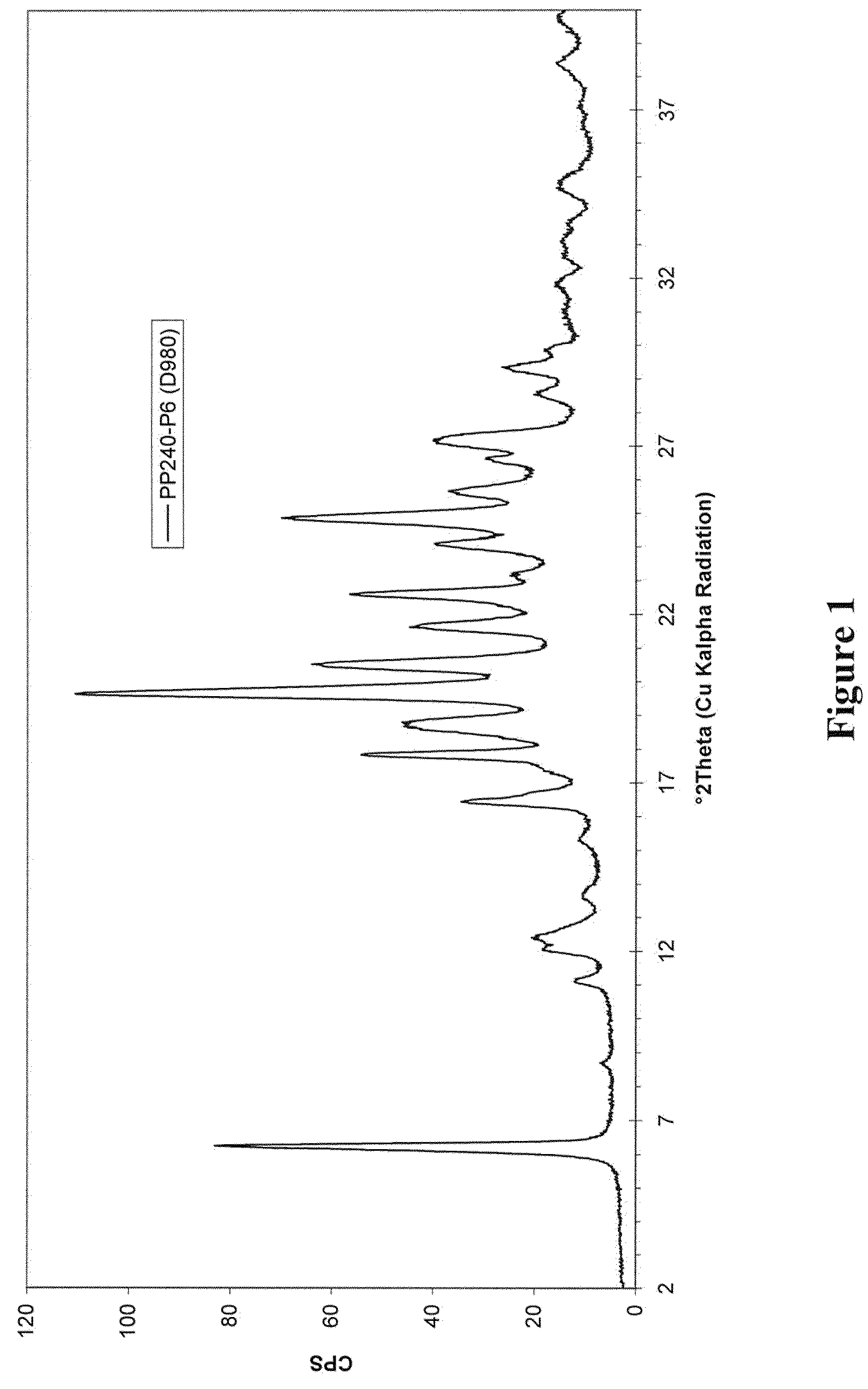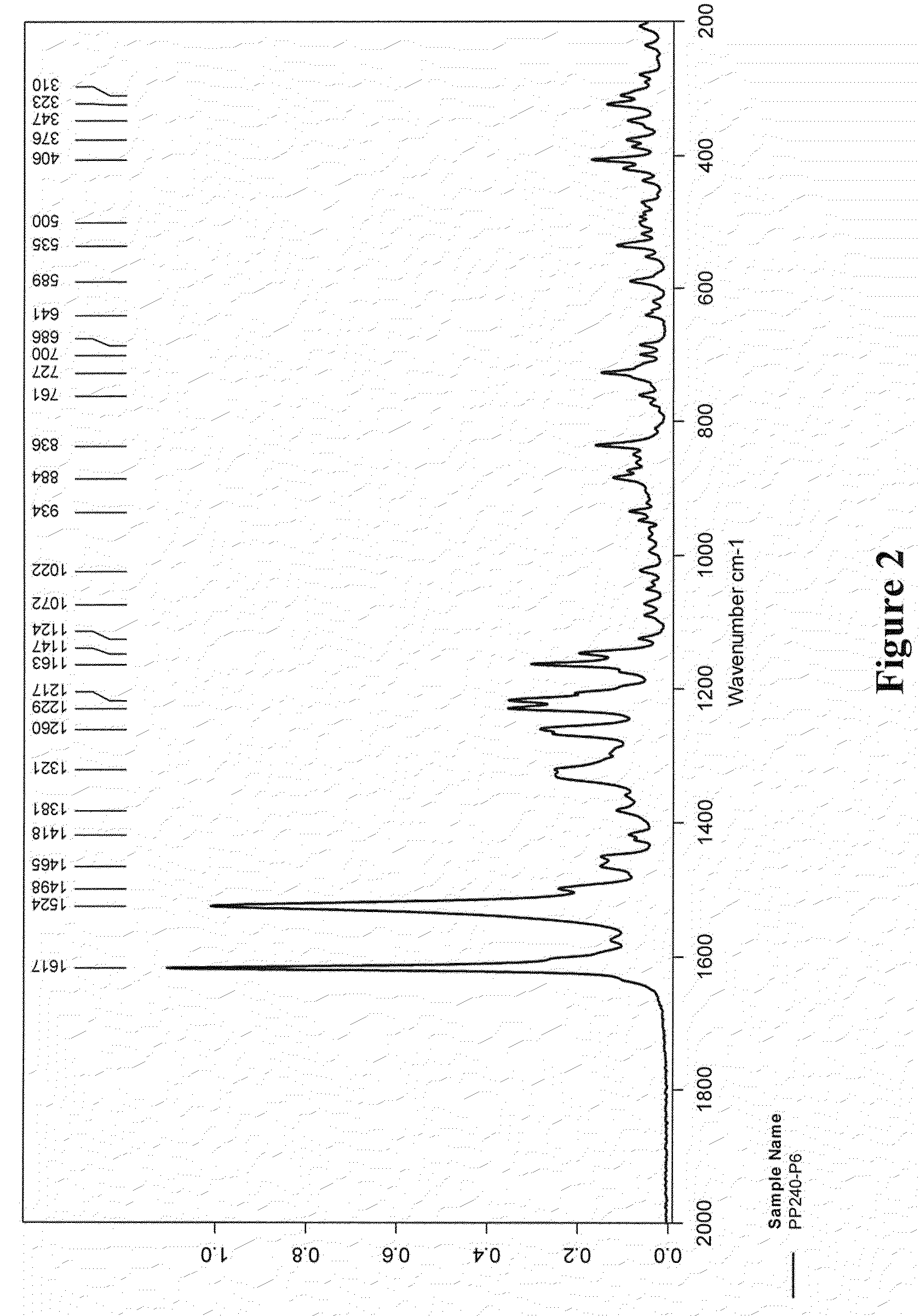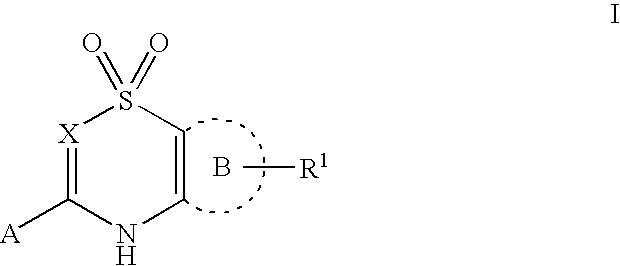5,6-dihydro-1H-pyridin-2-one compounds
a technology of dihydro-1hpyridin and compound, applied in the direction of biocide, drug composition, peptide/protein ingredient, etc., can solve the problems of hepatitis c major health problem affecting the survival rate of patients, etc., to achieve the effect of treating or preventing a hepatitis c virus infection
- Summary
- Abstract
- Description
- Claims
- Application Information
AI Technical Summary
Problems solved by technology
Method used
Image
Examples
example 1
(rac-di-exo)-N-{3-[3-(4-Fluoro-benzyl)-6-hydroxy-4-oxo-3-aza-tricyclo[6.2.1.02,7]undec-5-en-5-yl]-1,1-dioxo-1,4-dihydro-1λ6-benzo[1,2,4]thiadiazin-7-yl}-methanesulfonamide
[0363]
a) 2-Chloro-5-nitrobenzenesulfonamide
[0364]
[0365]To a solution of thionyl chloride (11 mL) and 2-chloro-5-nitro-benzenesulfonic acid (4.78 g, 20.1 mmol) was added N,N-dimethylformamide (0.92 μL) and the reaction mixture was heated at reflux for 4 h. The reaction mixture was then carefully quenched by pouring it into water and the product was isolated by vacuum filtration. The sulfonyl chloride was dissolved in a minimal amount of toluene and then added to a mixture of concentrated aqueous ammonium hydroxide solution (25 mL) and tetrahydrofuran (25 mL) at −10° C. After stirring for 2 h the reaction was quenched by adding a 6.0 M aqueous hydrochloric acid solution until pH 4 was reached. The layers were separated and the organic layer was concentrated in vacuo to a slurry. Pentane was added and the product was ...
example 2
(rac-di-endo)-N-{3-[3-(4-Fluoro-benzyl)-6-hydroxy-4-oxo-3-aza-tricyclo[6.2.1.02,7]undec-5-en-5-yl]-1,1-dioxo-1,4-dihydro-1λ6-benzo[1,2,4]thiadiazin-7-yl}-methanesulfonamide
[0396]
a) (rac-di-endo)-3-(4-Fluoro-benzylamino)-bicyclo[2.2.1]heptane-2-carboxylic Acid Ethyl Ester
[0397]
[0398](rac-di-endo)-3-Amino-bicyclo[2.2.1]heptane-2-carboxylic acid ethyl ester hydrochloride (1 g, 4.6 mmol) was suspended in methanol (23 mL). Sodium acetate (0.755 g, 9.2 mmol) was added followed by 4 Å powdered molecular sieves (1 g) and 4-fluoro-benzaldehyde (0.571 g, 4.6 mmol). Sodium cyanoborohydride (0.578 g, 9.2 mmol) was added and the mixture was stirred at 25° C. for 16 h. The mixture was poured into a 1:1 mixture of saturated aqueous sodium bicarbonate solution (200 mL) and ethyl acetate (200 mL). After shaking, both layers were passed through a plug of Celite. The organic layer was further washed with saturated aqueous brine solution (50 mL), dried over magnesium sulfate, filtered, and concentrated...
example 3
(rac-di-endo)-N-{3-[3-(5-Fluoro-pyridin-2-ylmethyl)-6-hydroxy-4-oxo-3-aza-tricyclo[6.2.1.02,7]undec-5-en-5-yl]-1,1-dioxo-1,4-dihydro-1λ6 benzo[1,2,4]thiadiazin-7-yl}-methanesulfonamide
[0401]
a) (rac-di-endo)-3-[(5-Fluoro-pyridin-2-ylmethyl)-amino]-bicyclo[2.2.1]heptane-2-carboxylic Acid Ethyl Ester
[0402]
[0403](rac-di-endo)-3-Amino-bicyclo[2.2.1]heptane-2-carboxylic acid ethyl ester hydrochloride (1 g, 4.6 mmol) was suspended in methanol (23 mL). Sodium acetate (0.755 g, 9.2 mmol) was added followed by 4 Å powdered molecular sieves (1 g) followed by 5-fluoro-pyridine-2-carbaldehyde (0.576 g, 4.6 mmol). Sodium cyanoborohydride (0.578 g, 9.2 mmol) was added and the mixture was stirred at 25° C. for 16 h. The mixture was poured into a 1:1 mixture of saturated aqueous sodium bicarbonate solution (200 mL) and ethyl acetate (200 mL). After shaking, both layers were passed through a plug of Celite. The organic layer was further washed with saturated aqueous brine solution (50 mL), dried over...
PUM
 Login to View More
Login to View More Abstract
Description
Claims
Application Information
 Login to View More
Login to View More - R&D
- Intellectual Property
- Life Sciences
- Materials
- Tech Scout
- Unparalleled Data Quality
- Higher Quality Content
- 60% Fewer Hallucinations
Browse by: Latest US Patents, China's latest patents, Technical Efficacy Thesaurus, Application Domain, Technology Topic, Popular Technical Reports.
© 2025 PatSnap. All rights reserved.Legal|Privacy policy|Modern Slavery Act Transparency Statement|Sitemap|About US| Contact US: help@patsnap.com



